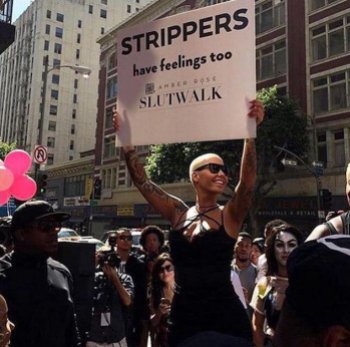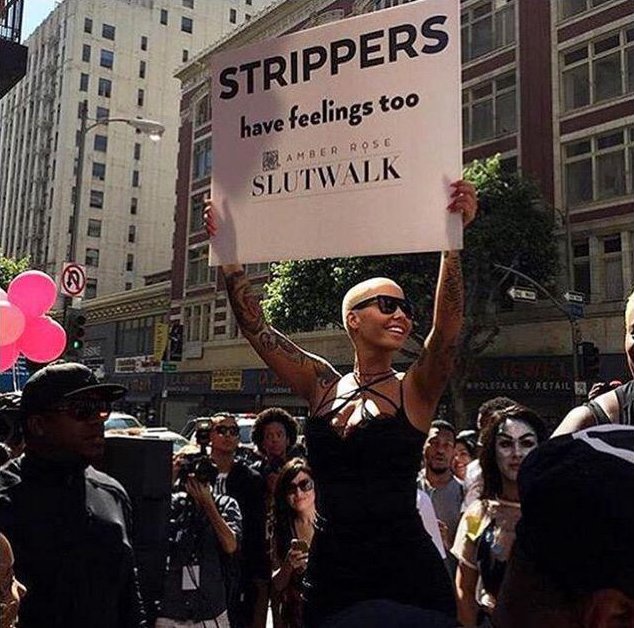
By Yayonah Bangura | Published October 22, 2015
Amber Rose wants you to know that she is not a role model. Mother, author, feminist and even former stripper, yes, but role model? Barely. However, if you’re not familiar with Rose or her celebrity status, you may be asking yourself why this even matters.
On Oct. 3, Amber Rose, former girlfriend to Kanye West and ex-wife of rapper Wiz Khalifa, led thousands of her supporters down Los Angeles’ Pershing Square in a “SlutWalk.” The walk was organized to raise awareness against slut-shaming, victim-blaming, rape culture, gender inequality and sexual and domestic violence against women.
Rose’s SlutWalk was one of several since 2011, when the movement was formed by Canadian college students after a Toronto police officer suggested that “women stop dressing like sluts” in order to prevent being sexually assaulted.
Since then, Slutwalks have been held all over the world, where women march and protest in scantily clad outfits to make a statement about not deserving violence or judgment regardless of their clothing choices.
Rose’s walk did the same by providing apparel for protesters to purchase, with t-shirts that with sayings like, “My clothes are not my consent,” or “My p***y my choice,” and boyshort underwear with derogatory labels like “whore” and “slut” on the back, mocking slut-shamers by taking the name-calling upon themselves.
Because the event was advertised and broadcast on social media, many people took to networks such as Twitter to either defend or criticize Rose and her message.
Supporters said that Rose’s SlutWalk was liberating and empowering to women who wish to be free of societal judgment, violence and labeling for their personal choices.
Some found the movement to be a positive step taken towards erasing the double standard of women being “soiled” for having a certain number of sexual partners, while men face no consequence for the same behavior.
Kean student Tre’monisha Falligan was on board with Rose’s movement.
“I don’t know why it’s more socially acceptable for a guy to talk about his conquests and the amount of women he’s slept with, but a woman can’t do the same,” said Falligan. “It’s an uncomfortable topic, but it’s something that we do need to discuss.”
She mentioned how most women today have a mandatory “three-guy” answer that they give to men who ask how many other men they’ve slept with, because they don’t want to be judged, and three sounds like the perfect number to symbolize “I’m experienced, but not promiscuous.”
But praise such as that came with twice as much backlash from all angles.
Rose provided for her family in Philadelphia as a stripper in her teen years and gained some popularity in the industry as a music video vixen, but she technically became famous overnight for dating Kanye West, then moving on to marry and conceive a son with Wiz Khalifa.
Both men denounced her character after their relationships, calling her “nothing but a stripper,” regardless of what they shared.
Considering the fact that she has been linked to other famous men, posts provocative photos on her social networks and is comfortable with her sexuality, critics felt that Rose was not the ideal person to represent women’s rights.
Some felt as if she was using the walk for publicity, encouraging young girls to sexualize themselves and giving her doubters more reasons to ridicule her.
Others felt as if she was using the struggles of women who face violence from men to push her own agenda for women to behave “promiscuously,” despite the fact that Rose and her supporters funded the walk themselves and made nothing from it, as all the proceeds went towards aiding sexual assault and domestic violence survivors.
“The campaign was for the right purpose, but I feel like she could have went about it a different way,” said Kean student Tamara Douglas.
Douglas said that upon running into articles online about the SlutWalk, she was initially uninterested because of its name and the fact that Rose was its spokesperson. It wasn’t until she was fully informed about the effort that she began to see its positivity.
“When we hear the word ‘slut,’ we automatically give it a negative connotation,it’s off putting. Some people see the title and pass it over immediately,” said Douglas.
“Rose wants to change the perception of the word, but she could have called it something different because there’s still a way that people can take it and make fun of her. There’s no pleasing in the game of slut-shame.”
Jill Hersh, a women’s studies professor at Kean, also approved of Rose’s effort, but thought that an increase in her audience would have been more beneficial.
“I think the movement and the cause would be more effective if it was able to attract more men as allies,” said Hersh. “It’s critical to any movement to have the people with the privilege and power ally with the marginalized group, to help and support them.”
Hersh suggested that Rose get a male celebrity ally who identifies as a feminist to gather support from both sides, but she stressed the importance of realizing that Rose is her own person who is making her efforts in the best way she knows how.
“My SlutWalk is 18 and over. This is for grown women. I am not raising your children,” said Rose following the Slutwalk.
“I’m not here to promote promiscuity at all. This is not about having sex with multiple people. This is about owning who you are as a person and basically you can do whatever a man can do. You have to live your life to the fullest.”
